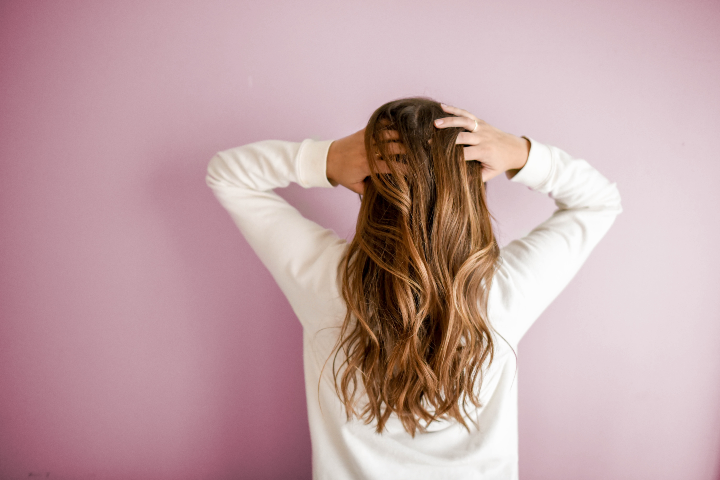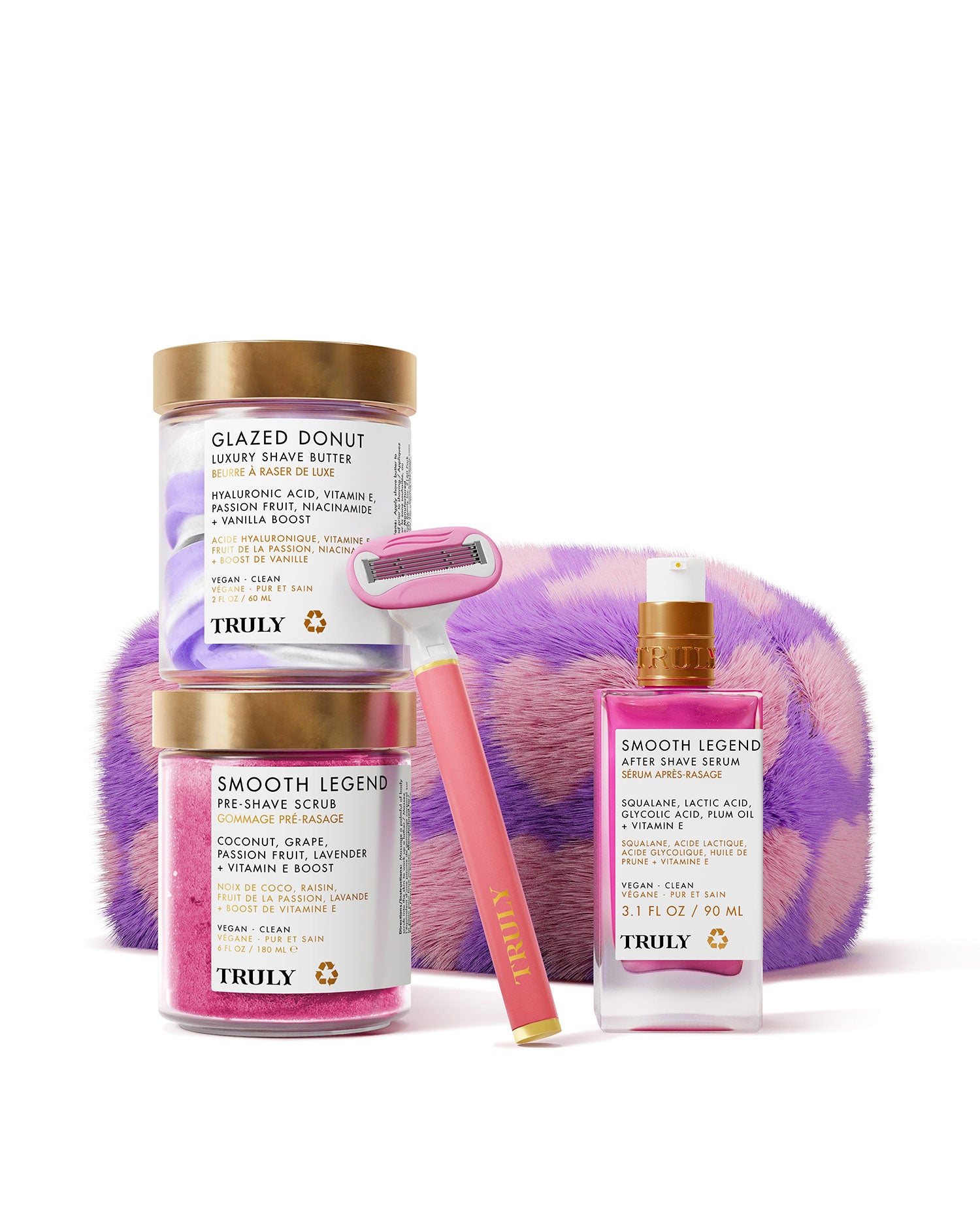Why Does My Hair Get Greasy So Fast?
January 25, 2023
By: Truly Beauty
Many women ask the same question: why does my hair get greasy so fast? You constantly find yourself foraging for the dry shampoo in a bid to conceal those greasy roots even though you only washed your hair yesterday.
Greasy hair happens to everyone. Even those who wash their hair every day. And it can happen for a number of reasons ranging from over-applying the conditioner to using a dirty hair brush and playing too much with your strands.
Keep scrolling to find out why your hair gets greasy after one day and most importantly: what you can do about it.
Why Does Hair Get Greasy?
If you're wondering why does my hair get greasy so fast you might want to look at these factors.
Your Hair Type
Different hair types appear greasy after different lengths of time. Those with thin, fine hair, for instance, may notice their hair looking greasy after just one day while those with thick, curly hair may be able to leave hair for a few days and it still looks fresh. Ultimately, it's all to do with the amount of oil/sebum your scalp produces.
Dirty Pillowcase
Can't remember the last time you washed your bedding? Sleeping on a dirty pillowcase could be why your hair is so greasy. Aim to change your pillowcase at least once a week to prevent oil and dirt transference.
Playing with Your Strands
Touching your hair too often can quickly lead to oily-looking locks. When you touch your hair, you transfer oils from your fingertips to your strands, making your mane appear greasy. Keep your paws off!
Overwashing Your Hair
When you have oily roots, it may be tempting to wash your hair more regularly. However, washing your hair every day might actually contribute to greasy roots. Why's that? Because once you've trained your hair into a daily shampoo session, it can feel icky if you try and get an extra day out of it.
Just like your skin, overwashing strips the skin of natural oils. As a result, your scalp produces more oil to compensate for that loss, leading to greasy strands.
"By over-washing your scalp and drying out that sebaceous gland, it has been proven that the gland will react by producing more oil," explains celebrity hairstylist Meaghan A. Frayne. "This becomes an unfortunate cyclical process of ‘now I’m greasy I have to wash again,’ causing your scalp to in return produce more oil faster."
Over-Applying Conditioner and Hair Masks
Conditioning after shampooing is an important step in the hair washing process. However, if you're slathering it on from roots to ends, this could be the reason behind your icky locks. Use conditioner sparingly and on your ends only. The higher you apply it, the faster your hair will become greasy. It can also lead to product build up, which can lead to greasiness.
Remember, if you've got thin or fine hair, use a lightweight conditioner or mask to hydrate your hair to prevent overburdening it with product. Those with coarse, thick hair can get away with using a richer formula.
Your Hairbrush is Dirty
Your hairbrush can harbor oil, dust, and a build-up of stale styling products. A dirty brush will transfer these nasties onto your hair, making it look and feel dirty. Make sure you wash your brush regularly to get rid of any product or oil buildup.
Are your brush bristles clogged with hairs? That could be another culprit behind your icky mane. By using a brush clogged with hairs, you'll only be transferring that grease from your oils hair onto your clean hair. It's a recipe for greasiness! Remove the hairs from your brush after every use to keep it clean and performing its best.
Product Buildup
Why does my hair get greasy so fast you ask? It could be the hair products you're using and how often you're using them. Are you constantly applying serums and other hair care products? You might want to give your locks a detox.
Most of the time, greasy hair is caused by an abundance of product clogged up on the scalp and strands. Use a clarifying shampoo 2-3 times a month, or an exfoliating product designed to remove dead skin and dirt on the scalp. Your hair will feel instantly fresher and bouncier.
How to Fix Greasy Hair Fast
Here are five ways to treat greasy hair fast so you can restore your fresh, bouncy tresses.
Fix 1: Double Cleanse Your Hair
Double cleansing the hair works just like the skincare method. The first wash removes dirt and product, and the second wash penetrates deeper for an in-depth clean. The process is effective for those dealing with greasy hair after a day.
It's important to choose a high quality, clarifying shampoo that's suitable for your hair type. And equally as important: using the right amount. According to hair pros, an almond-sized amount of product is more than enough to wash your scalp and strands. Avoid over-using shampoo to prevent oil production from going into overdrive, as this will only lead to oily scalp and oily hair.
Refrain from washing your hair in hot water as this can dry out your scalp and stimulate sebum production. It's always best to use cool or warm water when washing your hair. If you want healthy hair, remember to steer clear of formulas containing sulfates which can be damaging to the hair follicles and cuticles.
Fix 2: Wash Your Hairbrush
After washing your hair, make sure you comb or brush with clean tools. This is one of the most common reasons why hair gets greasy so fast. Your hairbrush accumulates hair, oil, and bacteria. If that's not washed away, it'll transfer back into your freshly washed strands, leading to greasiness.
Fix 3: Spray on Some Dry Shampoo
Dry shampoo may not be a long-term fix for greasy strands, but it's definitely a flash fix! Dry shampoo is an absorbent powder spray that soaks up extra oil in the hair in seconds.
Avoid using dry shampoo for too many days in a row, as it can cause build up on the scalp, leading to issues like dandruff. No dry shampoo on hand? Hairspray is another quick fix for giving your mane a boost.
Fix 4: Change Your Hairstyle
The best hairstyles for concealing greasy hair include high ponytails, braids, messy buns, half-up, half-down styles, and using accessories like hats or headbands. These styles help hide oily roots, making your hair look instantly fresher.
You can also try a slicked-back ponytail or bun for a polished look using hair products like gel or hairspray. While these hairstyles offer temporary solutions, it's important to address the underlying causes of greasiness through a proper hair care routine for long-term management.
Fix 5: Try Apple Cider Vinegar
A great DIY trick to treat greasy hair fast: wash your hair in apple cider vinegar. Simply dilute apple cider vinegar in a cup of water, and pour it through the hair. Leave it on for 4-5 minutes to let it banish build-up. Your hair will feel squeaky clean and 100% grease-free afterwards!
Besides being super effective, this greasy hair hack is easy on the purse strings, and should only set you back a dollar or two.
Why does my hair get greasy so fast? There are multiple reasons why hair gets greasy after one day. Follow our tips above for shiny, bouncy, beautiful strands each and every day! Speak to a trichologist if none of the above offer relief. You may have an underlying condition that needs addressing.




























